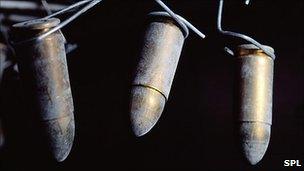Police cuts reduce forensic analysis, scientists claim
- Published

The FSS has been analysing more than 120,000 cases each year
Crime scene samples sent for forensic analysis by police forces in the East of England have fallen by almost a quarter, scientists have claimed.
Experts have said the fall is a direct result of police budget cuts.
The Forensic Science Service (FSS) at Huntingdon said cuts could lead to failed investigations and miscarriages of justice.
Police say the use of forensic services has reduced for financial and other reasons but deny falling standards.
The FSS is used by police forces in Bedfordshire, Cambridgeshire, Essex, Hertfordshire and Suffolk.
Some are carrying out forensic work themselves or are screening evidence to send what they believe are the best samples for analysis.
The average number of samples sent to laboratories in the past year is down by 23%, the FSS said.
'Mish-mash service'
Last month, Crime Reduction Minister James Brokenshire said advice from the Association of Chief Police Officers, Her Majesty's Inspectorate of Constabulary and others suggested that the UK forensics market would contract from £170m in 2009 towards about £110m by 2015.
In addition, police forces have been bringing forensic work in-house, in order to make cost savings.
FSS scientist and spokesman for the Prospect union, John Page said the issue of cost is never far from police officers' minds.
"The question that is often raised is how much is it going to cost," Mr Page said.
"In cases involving assaults, rapes and murders, submissions are not as extensive as they used to be.
"Also, submissions aren't necessarily all going to the same provider so it's creating a mish-mash service for the criminal justice system.
"It may well be that I go to a crime scene and choose some stains to DNA profile. Those stains may go to a different provider for analysis and I never see the results."
Forensic scientists are also concerned that police are increasingly carrying out in-house forensic work which is, they say, currently not of the standard of outside laboratories.
Speculative testing
They are worried that police are pre-screening crime scene material themselves before choosing what to submit for analysis.
Roger Blackmore, a private sector forensic scientist from Cambridgeshire-based Hayward Associates, said: "In the vast majority of cases the police will probably be right, they can reduce the amount of work they undertake and they will still get the same results.
"But where they have had to skimp on examination or items submitted for examination they may actually miss evidence.
"There are possibilities for miscarriages of justice, or that the police won't obtain the correct or the maximum amount of evidence."
Suffolk Police said financial pressures have forced it to cut back on speculative DNA testing in crimes such as assaults, burglaries, thefts and criminal damage.
A spokesman said: "The number of submissions of speculative DNA samples from undetected volume crime has reduced this year.
"This is in response to the financial pressures currently experienced by the police service.
"Notwithstanding this, the submission of samples is prioritised according to the seriousness of the crime and the potential of DNA samples to assist in its detection."
'Success rates'
Essex Police said: "Over the past year Essex Police has reassessed how DNA samples are selected for submission to forensic providers such as the FSS.
"This followed a review of our submissions policy in 2009.
"In assessing an article for submission we will take into account a number of issues such as the type of crime and potential success rates.
"We work closely with the FSS to analyse our previous submissions so we have the greatest understanding of how we can make the best use of technology such as DNA."
Cambridgeshire Police said it is cutting DNA testing in crimes where the chance of obtaining a sample is low.
Mr Page said that the imminent closure of the FSS by the government is a serious body blow to the criminal justice system.
"It creates the real likelihood of the guilty not being found guilty and those who are innocent not being exonerated for crimes which they haven't committed," he said.
A Home Office spokesperson said: "The continued availability of a professional and effective forensics service to the criminal justice system is our priority.
"The FSS is making huge financial losses and it is vital that we take clear and decisive action.
"It is not the sole provider of forensic services to the criminal justice system and it has lost market share over time due to increasing competition.
"This will have an impact on the samples it receives.
"We are confident that our plans will not adversely affect the criminal justice system, providing the best value for money for the taxpayer and supporting the market so that other forensics providers can adjust to meet demand."
- Published2 March 2011
- Published25 February 2011
- Published19 January 2011
- Published14 December 2010